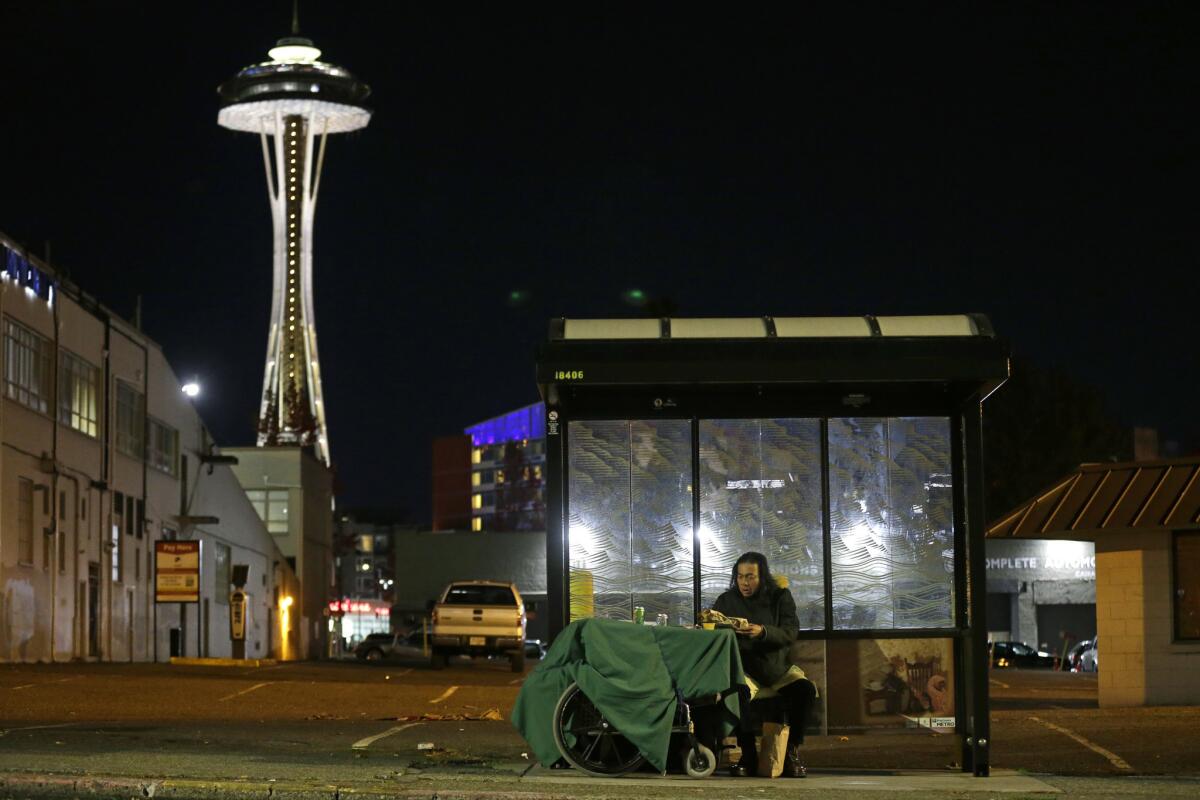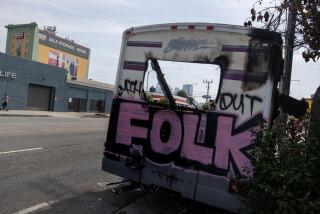Seattle judge rules a homeless man’s truck was his ‘home,’ and that has city officials worried

Steven Long, 57, has been calling his 2000 GMC Sierra pickup “home” for the last few years. Now he’s got a judge agreeing with him and the court papers to prove it.
Then again, if the judge’s recent ruling stands, say its critics, Seattle could become one of America’s most crowded, and socially lenient, places to live and sleep in your vehicle.
The outcome has the potential to make Seattle a haven for car and truck live-ins who prefer not to be harassed by police and parking-enforcement officers.
King County Superior Court Judge Catherine Shaffer saw to that on March 2 in an unusual ruling. Long’s rights were violated, she concluded, when police towed his pickup for being parked too long on a city street.
It was, after all, his home.
Shaffer said Long’s cumulative $900 fine was excessive under the 8th Amendment, which protects against “excessive fines.” She also ruled that the impoundment violated the state’s Homestead Act, which protects homes — including vehicles in which their otherwise homeless owners live, she noted — from being easily seized and forcibly sold.
Shaffer knocked about $300 off the fine and said the city did not have to stop impounding cars but would have to take into account that vehicles with live-in owners are homes, not merely transportation. The truck already was back in Long’s possession after he agreed to pay the fine in small installments.
City officials decried the decision.
The judge’s ruling effectively creates “a constitutional right to park one’s car wherever one wants, for as long as one wants,” Assistant City Atty. Michael Ryan said in court documents. King County, which includes Seattle, last year counted 2,300 people — about 20% of its homeless population — living in vehicles.
While Ryan and others see the ruling as further aggravating housing problems in Seattle, where the real estate market is among the nation’s hottest and most expensive, Long’s supporters mark it as a victory for the poor and homeless.
“This important decision may have a far-reaching impact, providing relief for many other people in our community who are struggling and choosing to make vehicles their homes in an effort to survive this affordable-housing crisis,” said Long’s attorney, Alison Bilow, from Columbia Legal Services, which provides free legal help.
Long’s pickup didn’t look like what most think of as a home, of course. It was an old truck, mostly in need of repairs, and sat broken down and unable to move in the same central Seattle parking spot for months.
Still, at night, when Long returned, it was a place where he could sleep and be safe.
Then one day in October 2016, it wasn’t.
“I came home, and it was gone,” said Long, who favors hard hats and sports a wild gray beard. He had just finished his janitorial shift at Century Link Field, Seattle’s football and soccer stadium, when he arrived at the empty parking space that night. “I was in total shock.”
Some nearby property owners saw the truck more as a nuisance than an abode. All of Long’s possessions were kept under a canopy in the truck’s bed and he slept in the cab. He had been homeless for four years, unable to find or afford intermittent housing even with his janitorial job.
“Everything I had was in that truck,” he said. “My tools, everything.”
Court records note that Long told police a week prior to the tow that he lived in the truck and couldn’t move it every 72 hours, as required by law. The officers left, but days later, Long found a $47 parking ticket on his windshield. The truck remained in the same spot, then disappeared a few days later.
At the impound lot, Long was told he owed $577 for the tow and storage, with an additional $27 added daily. Either he paid or the truck could be sold. He agreed to a $50-a-month payment plan and got his truck back, which he stored at a friend’s place out of town and began working on an appeal of the fines.
He borrowed a 1982 Chevy pickup to live in and continued to work janitorial and similar jobs.
“While the city didn’t charge him with a crime, they took his home — his most valuable asset — and left him to sleep in the same location on the ground under a tarp,” his attorneys said in a statement. “He was only able to secure the release of his home weeks later by agreeing to fees and fines which are overwhelming to a person experiencing homelessness.”
Attorneys thought Shaffer’s ruling was the first of its kind in the U.S. It may be, but other cities are facing the same issue. Los Angeles began looking for solutions after a federal appeals court in 2014 struck down a 1983 ban against living in cars.
In 2016, L.A. approved a measure to permit parking and sleeping in certain industrial or commercial districts. Los Angeles has an estimated 8,000 people living in vehicles, but the city has been slow to get its safe-parking program off the ground.
Other cities also have gone the safe route: Santa Barbara has a program with designated overnight parking lots. It also provides services, outreach aid and bathrooms. Seattle had several safe zones but is now down to one, and that’s set to shut down in April.
That could change in the wake of Shaffer’s ruling — and the city announced Wednesday that it would indeed appeal the judge’s decision.
Anderson is a special correspondent.
More to Read
Sign up for Essential California
The most important California stories and recommendations in your inbox every morning.
You may occasionally receive promotional content from the Los Angeles Times.










